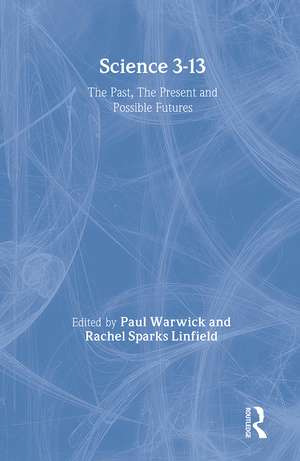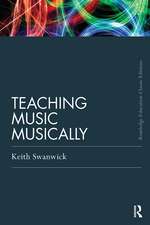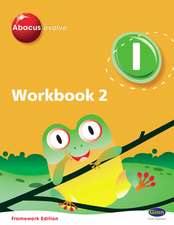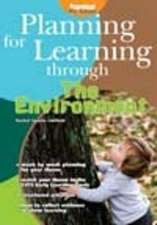Science 3-13: The Past, The Present and Possible Futures
Editat de Rachel Sparks Linfield, Paul Warwicken Limba Engleză Paperback – 10 feb 2000
Science 3-13 explores some of the historical antecedents of the current position of science in the lives of younger children. It covers the various influences, both from within and outside the teaching profession, that have shaped the current science curriculum. Current practice is examined and, on this basis, speculations are made about the future position and direction of this important subject.
The contributors each cover a particular aspect of science for the 3-13 age range but common themes emerge such as the influence of government intentions, particularly through the development of the National Curriculum. The role of research groups and the impact of ICT on the teaching profession as to what is important to teach and how science and science teaching should be viewed within society are shown to be important factors in the mix that contributes to change.
This book forms part of a series of key texts which focus on a range of topics related to primary education and schooling. Each book in the Primary Directions Series will review the past, analyse current issues, suggest coping strategies for practitioners and speculate on the future.
| Toate formatele și edițiile | Preț | Express |
|---|---|---|
| Paperback (1) | 413.95 lei 6-8 săpt. | |
| Taylor & Francis – 10 feb 2000 | 413.95 lei 6-8 săpt. | |
| Hardback (1) | 1000.17 lei 6-8 săpt. | |
| Taylor & Francis – 10 feb 2000 | 1000.17 lei 6-8 săpt. |
Preț: 413.95 lei
Nou
Puncte Express: 621
Preț estimativ în valută:
79.21€ • 86.31$ • 66.75£
79.21€ • 86.31$ • 66.75£
Carte tipărită la comandă
Livrare economică 23 aprilie-07 mai
Preluare comenzi: 021 569.72.76
Specificații
ISBN-13: 9780415227872
ISBN-10: 0415227879
Pagini: 160
Ilustrații: 6 tables
Dimensiuni: 156 x 234 x 13 mm
Greutate: 0.25 kg
Ediția:New.
Editura: Taylor & Francis
Colecția Routledge
Locul publicării:Oxford, United Kingdom
ISBN-10: 0415227879
Pagini: 160
Ilustrații: 6 tables
Dimensiuni: 156 x 234 x 13 mm
Greutate: 0.25 kg
Ediția:New.
Editura: Taylor & Francis
Colecția Routledge
Locul publicării:Oxford, United Kingdom
Public țintă
Postgraduate, Professional, and UndergraduateNotă biografică
Paul Warwick is a Lecturer in Primary Science at Homerton College, Cambridge. He previously taught in primary schools and was an Advisory Teacher for Science. His research interests are IT in science , children's understanding of the procedural aspects of science and the assessment of children's learning.
Rachael Sparks Linfield is a reception teacher at St John's College School, Cambridge and was previously a Lecturer in Primary Science at Homerton College, Cambridge. She was written widely in the area of early years education and her research interests include assessment of early years science.
Rachael Sparks Linfield is a reception teacher at St John's College School, Cambridge and was previously a Lecturer in Primary Science at Homerton College, Cambridge. She was written widely in the area of early years education and her research interests include assessment of early years science.
Recenzii
'There is much that is good in the book ... the book is most suitable for MA students and those wanting an introduction to issues of primary science in English schools.' - J.F. Donnelly, Studies in Science Education
Cuprins
Series Editor's Preface 1. Introduction Rachel Sparks Linfield and Paul Warwick 2. The Development of Science 3-13 and the Impact of the National Curriculum Ian Morrison and Linda Webb 3. The Growth and Development of Early Years Science Penny Coltman 4. Learning Concepts Elaine Wilson 5. Ideas About Procedural Understanding Paul Warwick 6. Assessing Learning in Science Rachel Sparks Linfield and Paul Warwick 7. Views on the 'Right Kind of Teacher' for Science John Hobden 8. The Impact of IT Angela McFarlane 9. The Influence of Interest Groups Philip Stephenson 10. Science in Society or Society in Science? Michael Reiss 11. Possible Futures Paul Warwick and Rachel Sparks Linfield
Descriere
Explores some of the historical antecedents of the current position of science in the lives of younger children. Current teaching practice is examined and on this basis speculations are made about the future direction of this subject.










